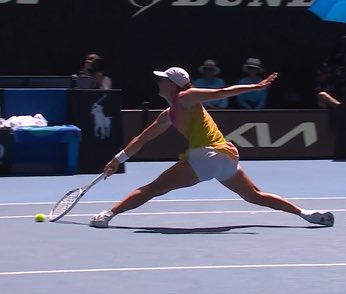A Quarterfinal Masterclass with a Controversial Twist
World No. 2 Iga Swiatek showcased her breathtaking form once again in the Australian Open, dismantling Emma Navarro 6-1, 6-2 to book her spot in the semifinals. However, the match was not without controversy, as a missed call by the umpire during the second set overshadowed Navarro’s valiant effort.
Swiatek’s victory extended her dominant run in Melbourne, dropping just 14 games in five matches and further cementing her status as the favorite for the title. Yet, the missed double-bounce call in the second set’s pivotal fifth game left some questioning the rules and review system.
Swiatek’s Unstoppable Form
Swiatek has been nearly flawless throughout the tournament, breezing past her first four opponents after a challenging opener against Katerina Siniakova. Against Navarro, Swiatek’s backhand dazzled, dictating cross-court rallies and producing stunning winners down the line. The Pole’s clean hitting and relentless pressure broke Navarro’s rhythm early, setting the tone for another commanding performance.
Swiatek’s ability to dominate from the baseline and retrieve seemingly impossible shots left Navarro, a player with exceptional mental resilience and fitness, struggling to gain a foothold. Despite her best efforts, the American found herself overwhelmed by Swiatek’s clinical execution and relentless consistency.
The Controversial Moment
The turning point of the match came in the second set, with Navarro trailing 2-3. The American had a break-point opportunity but was denied after Swiatek chased down a drop shot that replays showed had clearly bounced twice. The umpire missed the call, allowing Swiatek to hold serve and seize momentum.
Under current rules, players can only request a video review for a double bounce if they stop play immediately. Navarro, caught in the heat of the moment, did not challenge the call, leaving her unable to request a review post-rally. The incident sparked questions about the fairness of the rule and whether changes are needed to allow post-point reviews for such critical situations.
While the missed call was unlikely to change the match’s outcome, it denied Navarro her best chance to shift momentum. Swiatek capitalized on the error, breaking Navarro in the next game and cruising to victory.
A Ruthless Response to Pressure
Swiatek’s response to the controversy was emblematic of her dominance. She swiftly broke Navarro’s serve, extinguishing any hopes of a comeback. Her ability to maintain focus and elevate her game in key moments underscores why she’s considered one of the best players in the world.
Navarro, despite the loss, showed commendable resilience. After four grueling three-set matches to reach the quarterfinals, the American refused to bow out quietly, fighting hard until the final point.
A Semifinal Showdown Looms
With her semifinal spot secured, Swiatek now faces Madison Keys, who overcame Elina Svitolina in a three-set battle earlier in the day. Swiatek holds a 4-1 head-to-head record against Keys but remains cautious about the American’s power and aggression.
“Madison is a great player and really experienced,” Swiatek said after the match. “She can be very tricky, and I’ll have to be at my best.”
Questions About the Rules and Review System
The double-bounce controversy has reignited calls for reforming tennis’s review system. Critics argue that limiting video reviews to mid-rally incidents is unnecessarily restrictive, especially in cases where critical calls are missed. Allowing players to request reviews after a rally could prevent such errors from influencing high-stakes matches.
Swiatek’s Path to Glory
Despite the controversy, Swiatek’s level remains unparalleled in this year’s tournament. With defending champion Aryna Sabalenka looming in the other half of the draw, the stage is set for a potential blockbuster final. If Swiatek continues playing with the same precision and intensity, she may well add a sixth Grand Slam title to her already illustrious career.







